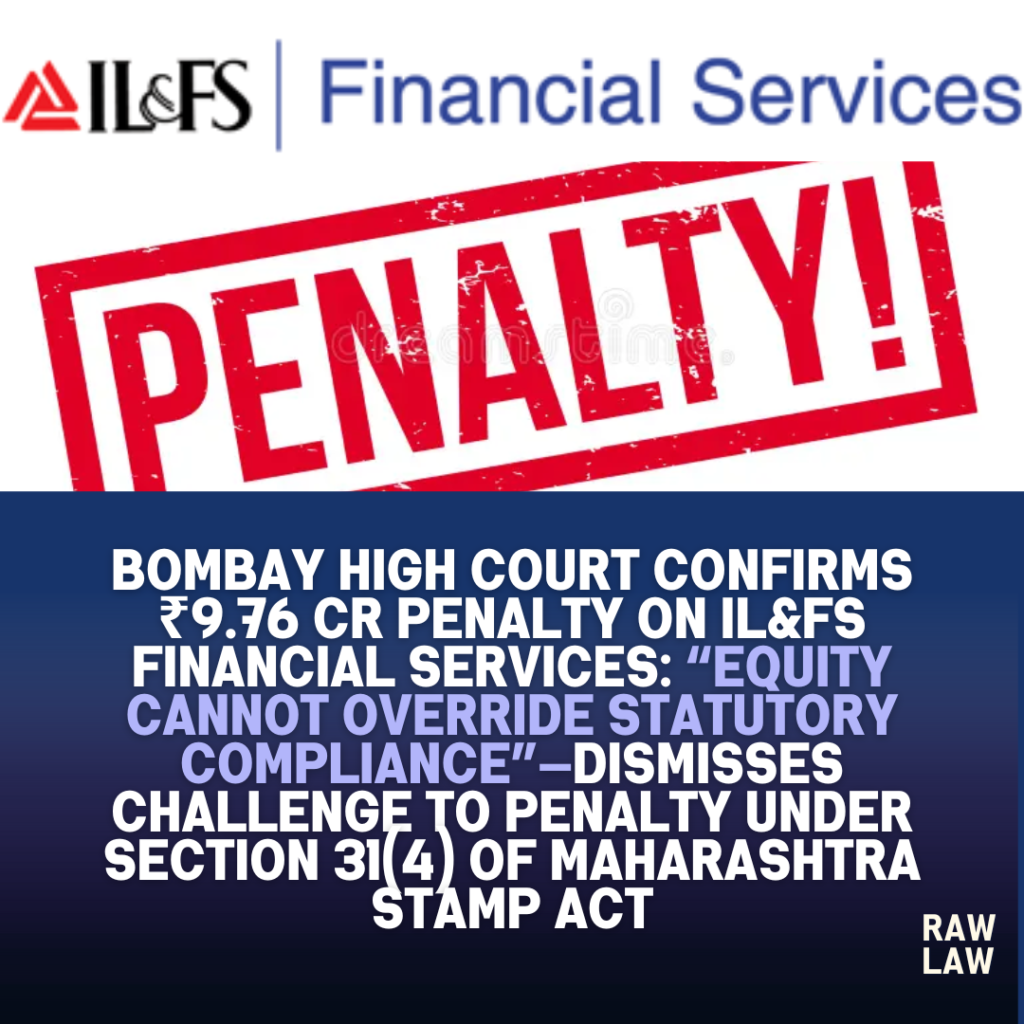Judgment Name: IL&FS Financial Services Ltd. v. State of Maharashtra & Ors.
Date of Judgment: 18 June 2025
Coram: Justice Jitendra Jain, Bombay High Court
Court’s Decision
The Bombay High Court dismissed the writ petition filed by IL&FS Financial Services Ltd., confirming the levy of penalty amounting to ₹9,76,03,385 under Section 31(4) of the Maharashtra Stamp Act. The Court rejected the plea to quash the penalty portion of demand notices dated 23 December 2013 and 31 December 2014, observing that the petitioner had admitted its stamp duty liability but failed to pay it within the statutory 60-day limit from the date of demand.
“Once there is a default of making payment of admitted stamp duty as per notice of demand within 60 days, the quantum of penalty as per Section 31(4) would have to be calculated from the date of the instrument.”
Facts
In April 2008, an order was passed by the Company Court approving a scheme of arrangement under the Companies Act, 1956. IL&FS lodged this scheme for stamp duty adjudication under Section 31 of the Maharashtra Stamp Act on 17 May 2008. Despite receiving requisitions in 2010 from the stamp authorities, the petitioner did not respond.
Subsequently, interim and final demand notices were issued on 23 December 2013 and 31 December 2014, respectively. These imposed stamp duty of ₹7,07,27,090 and penalty of ₹9,76,03,385 (calculated at 2% per month over 69 months). IL&FS did not dispute the stamp duty but challenged only the penalty through appeals and this writ petition.
Issues
- Whether the penalty imposed under Section 31(4) of the Maharashtra Stamp Act was justified.
- Whether the 60-day period for compliance commenced from the demand notices or from a later interim order of the appellate authority.
- Whether delay in adjudication justified waiver of penalty.
Petitioner’s Arguments
The petitioner primarily argued that:
- The 60-day period for triggering the penalty should begin from the interim order dated 25 March 2015, not from the 2013 or 2014 demand notices.
- The penalty was premature and unlawful as there was no formal “notice of demand” prior to the interim order.
- The delay in adjudication was attributable to the respondents, and thus the penalty should be waived.
Despite this, the petitioner had:
- Admitted liability to pay stamp duty on 19 December 2014.
- Deposited ₹7.07 crore stamp duty only on 27 March 2015.
- Consistently only challenged the penalty component in all earlier correspondence and appeals.
Respondent’s Arguments
The State contended that:
- The penalty was valid as per Section 31(4), triggered by failure to pay within 60 days from demand notice service.
- The petitioner had admitted stamp duty liability but delayed payment, making penalty unavoidable.
- The demand letter dated 23 December 2013 clearly started the 60-day clock.
- The interim order dated 25 March 2015 cannot be construed as a fresh demand notice.
Analysis of the Law
The Court analysed Section 31(4) of the Maharashtra Stamp Act, which mandates payment of stamp duty within 60 days from the service of demand. If unpaid, a 2% monthly penalty (up to four times the deficient portion) is leviable from the date of the instrument’s execution.
Justice Jain held:
- The petitioner never disputed the stamp duty and only sought relief against penalty.
- Admissions in letters dated 7 July 2014 and 19 December 2014, and appeal memo dated 14 January 2015, made it clear the liability to pay ₹7.07 crore was accepted.
- Payment made on 27 March 2015 was beyond the 60-day limit even from the latest possible start date (31 December 2014), thereby attracting the statutory penalty.
Precedent Analysis
‘No specific case precedents were cited by either side. However, the Court applied a strict interpretation of Section 31(4), relying on plain statutory construction and prior procedural conduct.
Court’s Reasoning
Justice Jain rejected IL&FS’s contention that the interim order of 25 March 2015 should reset the penalty clock. He emphasized that:
- The interim order only deferred penalty adjudication, it did not replace the original demand notice.
- The petitioner’s delayed payment beyond 60 days, despite admitted liability, attracted automatic penalty.
- Delay by the revenue authority in adjudicating stamp duty did not absolve the petitioner from complying with the statutory mandate post-demand.
“The interim order was for considering the issue of penalty on merits. The petitioner cannot put a condition of payment of stamp duty for adjudication of penalty and obtain interim relief to violate Section 31(4).”
Conclusion
The writ petition was dismissed with the following directions:
- Rule discharged.
- Interim stay granted earlier was vacated.
- The penalty of ₹9,76,03,385 was confirmed.
- IL&FS was directed to pay the penalty within 4 weeks, failing which recovery steps may be initiated.
Implications
This ruling reinforces strict compliance with statutory timelines under the Maharashtra Stamp Act. Entities must ensure timely payment post-adjudication or risk significant penalties. The Court clarified that judicial discretion under Article 226 cannot override express statutory consequences for default.
It also sets a precedent on the interpretation of “notice of demand” under Section 31(4), disallowing any tactical delays to reset the limitation period.
Summary of Cited Provisions
- Section 31(4), Maharashtra Stamp Act: Imposes a 2% monthly penalty from the date of the instrument’s execution if stamp duty is unpaid within 60 days of demand notice.
- Article 226, Constitution of India: Provides for extraordinary writ jurisdiction but cannot be used to dilute mandatory statutory obligations.



